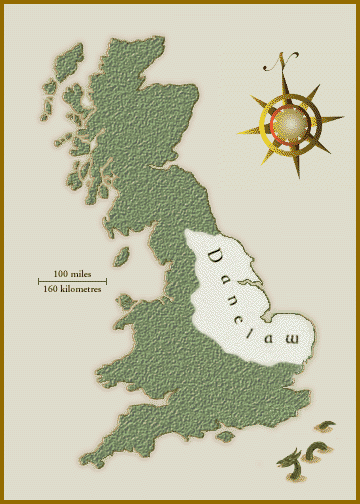|
The Danelaw
In the middle of a fierce fight for the future of England, the forces of the English and the Danes drew a line on a map and declared peace. This was the Danelaw. Alfred the Great had reversed his grim fortunes and won a resounding victory over Guthrum and the Danes, resulting in a treaty, in 886. Part of that peace arrangement was a division of the spoils that effectively divided England into two parts. To the south and west of that line was English territory, and Danish forces would have to respect that. To the north and east of that line was Danish territory, and English forces would have to respect that. In today's terms, the then-Danish territory included what is now these 14 shires:
One key result on the Danish side was that warriors turned to farming and settlement. Many English villages and estates gained new names as a result of this. In these Danish areas on English soil, Danish settlers practiced Danish customs, followed Danish laws, and spoke Old Norse or a similar Danish language. The Anglo-Saxon peoples had lent their own influence to place names. The Danes had their own influences to lend. A partial list of Danish suffixes is this:
The peace that created the Danelaw did not last long, and the Danes and English were again fighting, into the 10th Century. The English eventually gained the upper hand, and the regaining of York from the Danes in 954 was essentially the end of the Danelaw. |
|



 Bedford
Bedford
